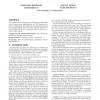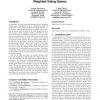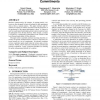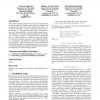95
Voted
ATAL
2008
Springer
15 years 3 months ago
2008
Springer
Recognizing team actions in the behavior of embodied agents has many practical applications and had seen significant progress in recent years. One approach with proven results is ...
74
Voted
ATAL
2008
Springer
15 years 3 months ago
2008
Springer
We present a proof-technique for reducing the nondeterminbstract agent specifications in a BDI framework by means of refinement. We implement the operational semantics of agent sp...
94
Voted
ATAL
2008
Springer
15 years 3 months ago
2008
Springer
Whether or not a critical threshold exists when epidemic diseases are spread in complex networks is a problem attracting attention from researchers in several disciplines. In 2001...
48
Voted
ATAL
2008
Springer
15 years 3 months ago
2008
Springer
m Design for Abstract Argumentation Iyad Rahwan 1 (Fellow) School of Informatics, University of Edinburgh, Edinburgh EH8 9LE, UK 2 Faculty of Informatics, British University in Dub...
111
Voted
ATAL
2008
Springer
15 years 3 months ago
2008
Springer
In this paper, we study false-name manipulations in weighted voting games. Weighted voting is a well-known model of cooperation among agents in decision-making domains. In such ga...
126
Voted
ATAL
2008
Springer
15 years 3 months ago
2008
Springer
Distributed constraint optimization (DCOP) is a promising approach to coordination, scheduling and task allocation in multi agent networks. In large-scale or low-bandwidth network...
113
Voted
ATAL
2008
Springer
15 years 3 months ago
2008
Springer
Multi-agent systems benefit greatly from an organization design that guides agents in determining when to communicate, how often, with whom, with what priority, and so on. However...
115
Voted
ATAL
2008
Springer
15 years 3 months ago
2008
Springer
Business contracts tend to be complex. In current practice, contracts are often designed by hand and adopted by their participants after, at best, a manual analysis. This paper mo...
114
Voted
ATAL
2008
Springer
15 years 3 months ago
2008
Springer
Coalitional games raise a number of important questions from the point of view of computer science, key among them being how to represent such games compactly, and how to efficien...
98
Voted
ATAL
2008
Springer
15 years 3 months ago
2008
Springer
Some natural epistemic properties which may arise in applications can only be expressed in standard epistemic logic by formulae which are exponentially long in the number of agent...




